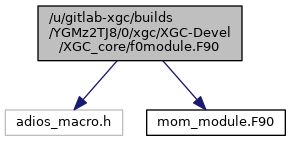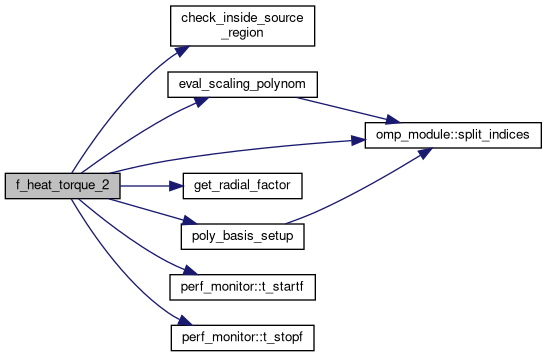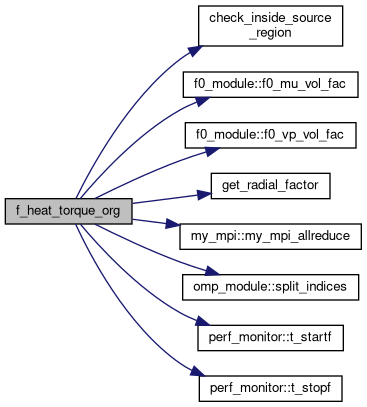|
| real(8) function | f0_module::exp_ad (x) |
| | adjusted exponential function for adiabatic response More...
|
| |
| subroutine | f0_module::set_f0_f0g_ptr (f0_inode1_new, f0_inode2_new, f0_f0g_cpp) |
| |
| subroutine | f0_module::f0_init_decomposed_ptrs (f0_T_ev_cpp, f0_fg_T_ev_cpp, f0_inv_grid_vol_cpp, f0_grid_vol_cpp, f0_grid_vol_vonly_cpp, f0_den_cpp, f0_flow_cpp) |
| |
| subroutine | f0_module::f0_get_f0g (grid, isp, itr, p, phi, mu_n_in, vp_n, f0g, err) |
| | Interpolates the grid distribution function to real space, velocity space location given by node, mu_n,vp_n. In poloidal plane it uses nearest neighbor and velocity space linear interpolation. More...
|
| |
| subroutine | f0_module::f0_set_ptrs (nnode, f0_delta_n_cpp, f0_delta_u_cpp, f0_delta_T_cpp) |
| | Sets pointers to cpp arrays for f0 arrays. More...
|
| |
| real(8) function | f0_module::f0_mu_vol_fac (ivr) |
| | Returns the v_perp/mu boundary factor for velocity integration Boundary vertices have only half the volume of an interior vertex. More...
|
| |
| real(8) function | f0_module::f0_vp_vol_fac (ivz) |
| | Returns the v_parallel boundary factor for velocity integration Boundary vertices have only half the volume of an interior vertex. More...
|
| |
| subroutine | f_heat_torque_2 (isp, mass, f0_f, f0_df0g, dt) |
| | Applies heat and torque sources Uses functionalities from mom_module and diffusion.F90 The modification df of the distribution function is evaluated with a set of orthonormal basis polynomials in v-space The following logic is applied: Toroidal rotation and torque source are treated as rigid body rotation. The time derivative of the angular velocity is dw/dt = T/I_tot, where T is the external torque and I_tot is the total moment of inertia of each source region. From dw/dt one obtains the time derivative of the local mean flow as du_para/dt = R B/B_phi * dw/dt * S(psi). S(psi) is the shape function of the source region. The change of the total energy in each region is given by delta_E_tot=P*delta_t, where P is the input power. The change of the energy at each node is proportional to the energy at the node delta_E_loc = delta_E_tot/E_tot * S(psi) E_loc. This makes sure that sum(delta_E_loc*S(psi_loc))=delta_E_tot. The change of the local temperature is the difference between delta_E_loc and the change of the kinetic energy of the mean flow: delta_T_loc = 2/(3*e*n*vol) * [delta_E_loc - m/2 n vol (2 u*delta_u + delta_u^2)]. More...
|
| |
| subroutine | poly_basis_setup (grid, isp, f0_f, n_poly, polynom, polynom_norm) |
| | Sets up a moment matrix of the current plasma distribution function and computes orthonormal polynomial basis for scaling of the plasma distribution function Polynomials: lambda_i = sum_[j=1]^4 c_[i,j] gamma_j where gamma_1 = 1, gamma_2 = v_||, gamma_3 = v_||^2, gamma_4 = v_pe^2, Inner product <lambda_i,lambda_j> = int[lambda_i lambda_j f d^3 v] Moment matrix defined by inner products <gamma_i,gamma_j> Gamma = | <1,1> <1 ,v_||> <1 ,v_||^2> <1 ,v_pe^2> | | <v_||,v_||> <v_|| ,v_||^2> <v_|| ,v_pe^2> | | <v_||^2,v_||^2> <v_||^2,v_pe^2> | | <v_pe^2,v_pe^2> |. More...
|
| |
| subroutine | eval_scaling_polynom (grid, den0, den, u_para, T_para, T_perp, isp, f0_f, delta_f, n_poly, polynom, polynom_norm) |
| | Computes the new distribution function after a diffusion time step by evaluating the scaling polynomials with the precomputed basis polynomials and the new moments (n,v_||,mu,v_||^2) More...
|
| |
| subroutine | f_heat_torque_org (isp, mass, c_m, t_ev, f0_f, f0_df0g, dt) |
| |
| subroutine | get_radial_factor (psi, dr, dz, pi, po, bdi, bdo, over_w, special_mode, ishape, factor) |
| | sub-subroutine to get radial (psi) factor trapezoid or gaussian More...
|
| |
| subroutine | check_inside_source_region (special_mode, rgn, dr, dz, psi, bdi, bdo, rad_sqr, is_affected) |
| |
|
| integer | f0_module::f0_nmu |
| |
| integer | f0_module::f0_nvp |
| |
| real(8), dimension(:,:,:,:), pointer | f0_module::f0_f0g => NULL() |
| | Stores the slow varying grid part of the distribution function. More...
|
| |
| real(8) | f0_module::f0_smu_max |
| |
| real(8) | f0_module::f0_vp_max |
| |
| real(8) | f0_module::f0_dsmu |
| |
| real(8) | f0_module::f0_dvp |
| |
| real(8), dimension(:,:), pointer | f0_module::f0_inv_grid_vol |
| |
| real(8), dimension(:,:), pointer | f0_module::f0_grid_vol |
| |
| real(8), dimension(:,:), pointer | f0_module::f0_grid_vol_vonly |
| |
| real(8), dimension(:,:), pointer | f0_module::f0_den |
| |
| real(8), dimension(:,:), pointer | f0_module::f0_t_ev |
| |
| real(8), dimension(:,:), pointer | f0_module::f0_flow |
| |
| real(8), dimension(:,:), pointer | f0_module::f0_fg_t_ev |
| |
| real(8), dimension(:,:), pointer | f0_module::f0_delta_n |
| | Flux-surface averaged change of density. More...
|
| |
| real(8), dimension(:,:), pointer | f0_module::f0_delta_u |
| | Flux-surface averaged change of parallel flow. More...
|
| |
| real(8), dimension(:,:), pointer | f0_module::f0_delta_t |
| | Flux-surface averaged change of temperature. More...
|
| |
| real(kind=8), parameter | f0_module::f0_mu0_factor =3D0 |
| | Set value of lowest mu in grid --> 1/f0_mu0_factor. More...
|
| |
| logical | f0_module::f0_use_linear_adiabatic = .false. |
| |
| real(8), parameter | f0_module::f0_linear_adiabatic_bd =0.7 |
| |
| subroutine eval_scaling_polynom |
( |
type(grid_type), intent(in) |
grid, |
|
|
real (kind=8), dimension(f0_inode1:f0_inode2), intent(in) |
den0, |
|
|
real (kind=8), dimension(f0_inode1:f0_inode2), intent(in) |
den, |
|
|
real (kind=8), dimension(f0_inode1:f0_inode2), intent(in) |
u_para, |
|
|
real (kind=8), dimension(f0_inode1:f0_inode2), intent(in) |
T_para, |
|
|
real (kind=8), dimension(f0_inode1:f0_inode2), intent(in) |
T_perp, |
|
|
integer, intent(in) |
isp, |
|
|
real (8), dimension(-f0_nvp:f0_nvp, f0_inode1:f0_inode2, 0:f0_nmu, ptl_isp:ptl_nsp), intent(in) |
f0_f, |
|
|
real (kind=8), dimension(-f0_nvp:f0_nvp,f0_inode1:f0_inode2,0:f0_nmu), intent(out) |
delta_f, |
|
|
integer, intent(in) |
n_poly, |
|
|
real (8), dimension(n_poly,n_poly,f0_inode1:f0_inode2), intent(inout) |
polynom, |
|
|
real (8), dimension(n_poly,f0_inode1:f0_inode2), intent(inout) |
polynom_norm |
|
) |
| |
Computes the new distribution function after a diffusion time step by evaluating the scaling polynomials with the precomputed basis polynomials and the new moments (n,v_||,mu,v_||^2)
Ansatz: g = sum_[i=1]^4 d_i lambda_i f ==> d_i = int(lambda_i g d^3v) / <lambda_i,lambda_i> = sum_[j=1]^4 c_[i,j] int(gamma_j g d^3v) / <lambda_i,lambda_i> After some manipulation —> g = f sum_[k=1]^4 D_k gamma_k with D_k = sum_[i,j=1]^4 int(gamma_j g d^3v * c_[i,j]*c_[i,k] / <lambda_i,lambda_i>
- Parameters
-
| [in] | grid | Grid data, type(gridtype) |
| [in] | den0 | Density prior to diffusion step, real(8) |
| [in] | den | Density after diffusion step, real(8) |
| [in] | u_para | Parallel flow after diffusion step, real(8) |
| [in] | T_para | Para. Temperature after diffusion step, real(8) |
| [in] | T_perp | Perp. Temperature after diffusion step, real(8) |
| [in] | alpha | Ratio of parallel to perp temperature prior to diffusion step, real(8) |
| [in] | isp | Species index, integer |
| [in] | f0_f | Full distribution function, real(8) |
| [out] | delta_f | Change of the distribution function due to anomalous diffusion, real(8) |
| subroutine poly_basis_setup |
( |
type(grid_type), intent(in) |
grid, |
|
|
integer, intent(in) |
isp, |
|
|
real (8), dimension(-f0_nvp:f0_nvp, f0_inode1:f0_inode2, 0:f0_nmu, ptl_isp:ptl_nsp), intent(in) |
f0_f, |
|
|
integer, intent(in) |
n_poly, |
|
|
real (8), dimension(n_poly,n_poly,f0_inode1:f0_inode2), intent(inout) |
polynom, |
|
|
real (8), dimension(n_poly,f0_inode1:f0_inode2), intent(inout) |
polynom_norm |
|
) |
| |
Sets up a moment matrix of the current plasma distribution function and computes orthonormal polynomial basis for scaling of the plasma distribution function Polynomials: lambda_i = sum_[j=1]^4 c_[i,j] gamma_j where gamma_1 = 1, gamma_2 = v_||, gamma_3 = v_||^2, gamma_4 = v_pe^2, Inner product <lambda_i,lambda_j> = int[lambda_i lambda_j f d^3 v] Moment matrix defined by inner products <gamma_i,gamma_j> Gamma = | <1,1> <1 ,v_||> <1 ,v_||^2> <1 ,v_pe^2> | | <v_||,v_||> <v_|| ,v_||^2> <v_|| ,v_pe^2> | | <v_||^2,v_||^2> <v_||^2,v_pe^2> | | <v_pe^2,v_pe^2> |.
===> <lambda_i,lambda_j> = sum_[k,l=1]^4 c_[i,k] Gamma_[k,l] c_[j,l] ==> lambda_i^T.A.lambda_k The coefficients c_[i,l] are calculated with Gram-Schmidt process lambda_i = gamma_i - sum_[j=1]^[i-1] <gamma_i,lambda_j>/<lambda_j,lambda_j> lambda_j
The coefficients of the basis polynomials are stored in a 4x4 matrix, The inner products in the matrix A are stored in a 10-element vector starting with the main diagonal, then going through the upper side diagonals.
The moments in the matrix Gamma are evaluated from the global variable storing the distribution function --> f0_f
The coefficients c_[i,j] of the basis polynomials are stored in "diff_polynom" and the norms <lambda_i,lambda_i> are stored in "polynom_norm"
- Parameters
-
| [in] | grid | Grid data, type(grid_type) |
| [in] | isp | Species index, integer |
| [in] | f0_f | full distribution function, real(8) |








